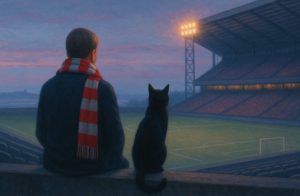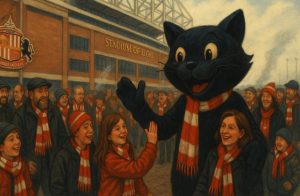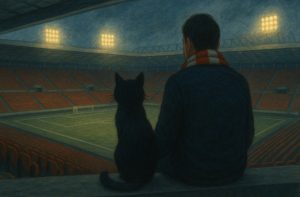Sunderland Association Football Club, known throughout England and beyond, has a nickname that stands out in a sea of Uniteds, Blues, and Rovers: The Black Cats. At first glance, it sounds mythical, maybe even whimsical, but this moniker has a deep, layered, and sometimes confusing history.
Nicknames in football are usually the product of organic fan culture, evolving over time with chants, colours, or geography. But Sunderland’s nickname, while now officially adopted, stems from a combination of folklore, military legacy, local legend, and a surprisingly modern act of democracy a public vote.
This makes Sunderland’s story not only unusual but also one of the most detailed and debated origins of any football nickname in the English game.
What Is the History Behind Sunderland AFC?

Founded in 1879, Sunderland AFC quickly grew to become a cornerstone of football in the North East.
The club has achieved considerable success, including six top-flight league championships, placing it among the more historically decorated clubs in England.
For much of its early history, the club played at Roker Park, a stadium so entwined with its identity that fans and the press often referred to Sunderland as “The Rokerites”.
This nickname persisted until the club moved to the modern Stadium of Light in 1997, a move that coincided with a broader push to redefine and modernise the club’s public image.
With the move came a re-evaluation of the club’s identity, and the idea of a more distinctive and meaningful nickname took hold.
Where Did the ‘Black Cats’ Nickname Originate?
The origins of the “Black Cats” nickname are rooted in both fact and folklore, and that’s part of what makes it so fascinating and occasionally confusing.
One of the earliest known references comes from 1805 when a gun battery situated on the south pier at Roker was home to a group of local soldiers.
One night, a guard heard strange wailing, which he believed to be a spirit or threat, only to discover it was a black cat.
From then on, the battery earned the informal name Black Cat Battery. It’s believed that this local landmark influenced the club’s later adoption of the nickname, especially considering its proximity to where Sunderland AFC would eventually form.
The legend of Joshua Dunn, a volunteer soldier with the Sunderland Loyal Volunteer force, also feeds into this story.
According to historical anecdotes, Dunn was so startled by the sound of a black cat while on guard that it became part of the folklore surrounding the Black Cat Battery.
The tale might seem apocryphal, but it helped cement the animal’s place in Sunderland lore.
Further reinforcing the connection, Sunderland’s early club badge featured a black cat, along with symbols of maritime strength and local heritage, such as a ship and the city’s coat of arms.
These elements, although somewhat disconnected, began to weave a cultural identity for the club one that fans could rally around, even if the exact origin of the nickname remained ambiguous.
How Is the Black Cat Linked to Sunderland’s Military History?
Sunderland’s geographical position on the River Wear made it a strategic location for defence during the 18th and 19th centuries. Several gun batteries were built along the coast to protect the area from naval attacks.
The most notable for this story is the John Paul Jones Battery, later known informally as the Black Cat Battery due to the presence of a resident black cat.
This small detail, just a cat living near a batter transformed into a local legend, becoming symbolic of vigilance, mystique, and protection.
When Sunderland AFC was later founded in the same region, it wasn’t long before those same themes were drawn into the club’s narrative.
What began as local folklore evolved into a defining part of the club’s identity, shaping its symbolism for over a century.
When Did Sunderland Officially Become the Black Cats?
Despite the nickname floating around for many decades, it wasn’t until the year 2000 that Sunderland formally adopted The Black Cats as the club’s official moniker.
The process was anything but traditional. A public vote was organised by the club to choose a new identity following the move to the Stadium of Light.
The choices on the ballot included:
| Option | Description |
| Black Cats | Rooted in folklore and history |
| Miners | Reference to Sunderland’s coal heritage |
| Light Brigade | Possibly referencing the Stadium of Light |
| SoLs | Acronym for Stadium of Light Supporters |
Over 11,000 fans voted, and the Black Cats won by a significant margin. While some purists argue that nicknames should arise naturally rather than through polls, the decision was seen as a way to bring historical resonance and a unique identity into the club’s branding.
The rebrand brought a new logo featuring a black cat, and a costumed mascot was introduced. Merchandise, press releases, and club materials all began referring to Sunderland as The Black Cats, giving the nickname permanence.
What Role Does the Black Cat Play in Sunderland’s Club Culture?

Long before the nickname became official, black cats had a symbolic presence in Sunderland’s footballing culture. A black cat was famously seen near Roker Park and was rumoured to bring the team good luck, at least temporarily.
In 1909, a newspaper reported that black cat portraits were outselling player images in local shops.
That same year, as Sunderland prepared for a high-stakes FA Cup quarter-final against Newcastle United, thousands of fans travelled adorned with black cat mascots.
Another curious story from 1937 adds to the mythos: a fan reportedly smuggled a black cat into Wembley Stadium for the FA Cup final against Preston.
While the image of someone keeping a cat in their coat for the duration of a match is questionable, the tale has endured as part of the club’s unique folklore.
Despite its strong branding presence, it’s worth noting that many Sunderland supporters don’t refer to themselves as “Black Cats fans” in everyday conversation. It remains more of an emblem, a branding tool, and symbol than a spoken identity among the fanbase.
How Does Sunderland’s Nickname Compare to Other English Football Clubs?
Many clubs have nicknames that directly reflect either their colour scheme or geographical identity. Sunderland’s stands out for its uniqueness and layered backstory.
Here’s how it compares to others:
| Club | Nickname | Origin |
| Sunderland AFC | Black Cats | Military folklore, fan vote, local legend |
| Newcastle United | Magpies | Black and white kit resembling magpie |
| West Ham United | Hammers | Historical link to ironworks and industry |
| Leicester City | Foxes | Region known for fox hunting |
| Wycombe Wanderers | Chairboys | Historical association with chair-making |
Sunderland’s nickname may not be shouted as commonly as “Red Devils” or “Gunners,” but it carries far more historical and symbolic depth than many.
Why Does the Black Cat Still Matter Today?

Even though the nickname may not have been organically adopted, it has become central to Sunderland’s modern branding and heritage storytelling.
The club’s crest, merchandise, and media consistently feature black cat imagery, reinforcing the identity.
That said, its impact on results has been dubious. Since officially adopting the nickname, Sunderland has experienced four relegations, prompting some to ironically question whether the “lucky” symbolism of the black cat is misplaced.
Still, the nickname continues to offer value in the following ways:
- Brand Differentiation: It gives Sunderland a distinctive image among English clubs.
- Local Relevance: Tied to Sunderland’s geography and folklore.
- Cultural Consistency: Integrated into club rituals, branding, and storytelling.
Though fans may not say “we are the Black Cats” in chants, they still wear it with quiet pride.
What Does the Black Cats Nickname Say About Sunderland?
The Black Cats nickname encapsulates Sunderland’s ability to embrace quirkiness, tradition, and reinvention. It’s both a tribute to local legends and a testament to how football clubs can use history creatively in shaping their identities.
Where some clubs have nicknames born out of simplicity, Sunderland’s stands as a rich tapestry of regional history, wartime tales, feline folklore, and democratic choice.
It may not be a perfect nickname in the traditional sense, but it perfectly fits Sunderland, a club known for its resilience, character, and deeply rooted local ties.
FAQs About Sunderland AFC and the Black Cats
What is the origin of Sunderland’s nickname ‘The Black Cats’?
It stems from a combination of local folklore, military references to the Black Cat Battery, and superstition involving a black cat seen near Roker Park.
When did Sunderland officially become the Black Cats?
The nickname was formally adopted in 2000 after a fan vote, following the club’s move to the Stadium of Light.
What was Sunderland’s nickname before the Black Cats?
They were commonly referred to as “The Rokerites,” named after their former stadium, Roker Park.
Was there really a black cat at Roker Park?
Yes, fan stories and newspaper reports confirm that a black cat was seen near Roker Park, and it became a symbol of luck and identity.
Did the black cat mascot influence Sunderland’s success?
Symbolically, yes, but in practice, the club has faced relegations since adopting the nickname, challenging the notion that black cats bring good luck.
Do fans use the nickname in conversation?
Not often. While “Black Cats” is used officially and in media, most fans simply refer to their club as “Sunderland”.
Why was a vote held to decide the nickname?
Following the move to the Stadium of Light, the club sought to refresh its identity and let fans choose a new nickname. “Black Cats” won decisively.






